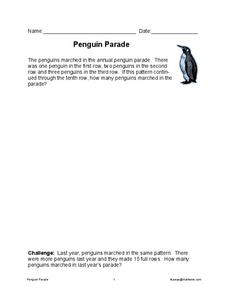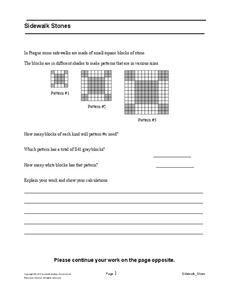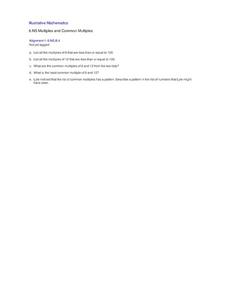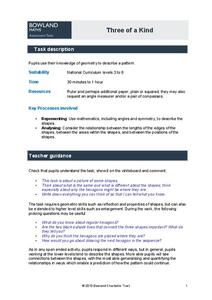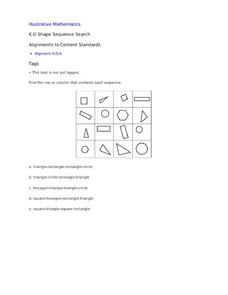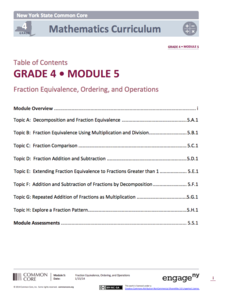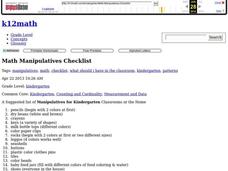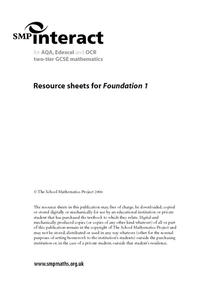Curated OER
Look for Patterns: Quilts in Two Faith Ringgold Stories
Author Faith Ringgold uses quilts to illustrate her books Tar Beach and Aunt Harriet's Underground Railroad. In this integrated trio of activities, young scholars read stories, identify and create patterns, and design quilt squares of...
Curated OER
Math Sequencing Activities
Recognizing patterns and sequences in groups of numbers is an essential skill for all students to learn.
Curated OER
All A-buzz About Math
Second graders participate in Math-Eze activities to comprehend word problems. In this word problem lesson, 2nd graders recognize why a hexagon is the best shape for a beehive. Students calculate how far bees must travel to find 2 lbs....
Curated OER
Math Sequences, Patterns and Rules
In this math sequences worksheet, students complete 25 problems pertaining to math patterns and sequences. Students complete the patterns and write the rule. This page is intended as an online activity, but may be completed on paper.
Curated OER
Make Your Own Patterns
For this patterns enrichment worksheet, 1st graders create patterns that have been started from different shapes. In this coloring activity, students complete five groups of patterns.
Curated OER
Cube Coloring Problem
Upper elementary and middle schoolers describe the various features of unit cubes, such as edges, corners, and faces. They also discuss how to represent measurements of a cube using exponents before engaging in various thinking and...
Education Closet
Equal Rhythms
Engage young mathematicians in learning about fractions with this cross-curricular math and music lesson. After listening to and repeating different beat patterns, children realize that musical notes are just another way of representing...
Math Wire
Penguin Parade
Make way for the penguin parade! Based on a given pattern of penguins in an ascending number of rows, how many penguins were marching this year? Learners solve two word problems to find the answer.
Mathematics Assessment Project
Sidewalk Stones
One block, two blocks, white blocks, gray blocks. In the high school assessment task, learners investigate patterns of sidewalk stones to develop a quadratic expression for each colored block. Young mathematicians then use the expression...
Illustrative Mathematics
Multiples and Common Multiples
Learners are asked to find multiples and common multiples of two numbers. They must take their findings and find a pattern between the numbers and explain their reasoning. Use this resource with The Florist Shop activity in this series...
Annenberg Foundation
Geometry 3D Shapes: Euler's Theorem
How do you get a theorem named after you? Euler knows what it takes! The third lesson of five asks pupils to use an interactive activity to compare the faces, vertices, and edges of seven different three-dimensional solids. They use...
American Statistical Association
What Fits?
The bounce of a golf ball changes the result in golf, mini golf—and a great math activity. Scholars graph the height of golf ball bounces before finding a line of best fit. They analyze their own data and the results of others to better...
Bowland
Three of a Kind
One is chance, two is a coincidence, three's a pattern. Scholars must determine similarities and differences of a regular hexagon undergoing dilation. They look at lengths, angles, areas, and symmetry.
Illustrative Mathematics
Shape Sequence Search
Learning that size and orientation don't affect the classification of shapes is a big step for young mathematicians. Support children with developing this key understanding by looking at the array of shapes included in this resource. For...
EngageNY
Algebraic Expressions—The Distributive Property
Do your classes truly understand the distributive property? Use a demonstrative lesson to represent the distributive property in various ways. Learners solidify understanding by creating a geometric pattern for distributive property, and...
EngageNY
Fraction Equivalence, Ordering, and Operations
Need a unit to teach fractions to fourth graders? Look no further than this well-developed and thorough set of lessons that takes teachers through all steps of planning, implementing, and assessing their lessons. Divided into eight...
Curated OER
Patterns
Fourth graders investigate patterns and sequences. In this patterns and sequences lesson, 4th graders use a hundreds chart to build recurring patterns. Students skip count by threes and fives on a hundreds chart by coloring multiples...
Curated OER
Patterns
Explore early algebra by participating in a pattern identification activity using a random assortment of different household materials. The class creates, completes, and analyzes different patterns with the help of leggos, buttons,...
School Mathematics Project
Resource Sheets
This extensive and far-reaching collection of worksheets puts a new twist on many basic concepts. Learners use multiplication to trace a path from one point to another, tile a plane by converting between improper and proper fractions,...
Curated OER
Design Explorations: Frieze Patterns
Students will explore frieze patterns. A frieze pattern is a mathematical concept to classify designs on two-dimensional surfaces, which are repetitive in one direction, based on the symmetries in the pattern. They will explore examples...
Curated OER
Using Concrete Manipulatives to Generate Algebraic Patterns
Use concrete manipulatives to solve algebraic equations by having students watch videos and complete manipulative arrangement activities to find algebraic equations that solve the given word problems. They will finish with two...
Curated OER
Creating AB Patterns
Students work with patterns. In this pattern lesson, students find AB patterns in nature and the manmade world. They create their own AB pattern using math manipulatives and visual arts.
Curated OER
A Matter of Pattern
Students explore how shapes can make patterns then make connections as to how elements in a pattern relate to one another. In this matter of pattern instructional activity, students create a multi-folded paper snowflake. Students engage...
National Security Agency
Multiple Representations of Limits
After an introductory activity to demonstrate the theory of a limit, additional activities approach a limit from graphical, numerical, and algebraic methods. The activity looks at the multiple ways of understanding and evaluating a limit.









